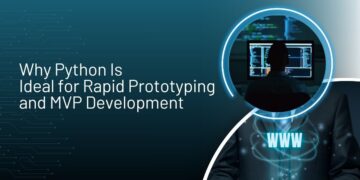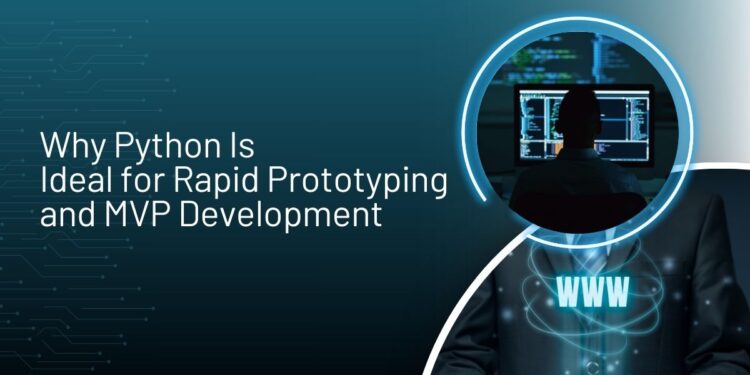Python is a popular programming language known for its simplicity, readability, and flexibility. These qualities make it an ideal choice for developing prototypes and Minimum Viable Products (MVPs). For businesses looking to bring new ideas to market quickly, using Python allows for rapid iteration, testing, and adaptation of concepts. When you hire Python developers or opt for Python development outsourcing, you benefit from faster development cycles and lower costs. In this article, we will explore the advantages of using Python for prototyping and MVPs.
What Makes Python Suitable for Rapid Prototyping?
1. Easy-to-Learn Syntax
Python’s syntax is simple, resembling human language. This ease of use enables developers to write code faster, making it easier to build and modify prototypes. The focus remains on solving problems rather than struggling with complex syntax.
Example: A developer can create a basic web server using just a few lines of Python code. This speed allows teams to validate concepts and get feedback faster.
2. Extensive Libraries and Frameworks
Python boasts a wide range of libraries that can significantly reduce development time. Libraries like Django and Flask are well-suited for building web applications. For data analysis and machine learning, Python offers libraries such as Pandas, NumPy, and TensorFlow.
Example: With Django, developers can quickly set up a backend with RESTful APIs. This setup supports both web and mobile applications, making it a perfect choice for MVPs.
3. Versatility Across Domains
Python is a versatile language. It is suitable for various applications, from web development and data analysis to machine learning and automation. This versatility makes it a preferred choice for startups looking to explore multiple market opportunities with a single MVP.
Example: A startup focusing on healthcare analytics can use Python to develop machine learning models for data analysis and then integrate them into a web app using Flask.
Key Benefits of Using Python for MVP Development
1. Cost-Effectiveness
Developing an MVP with Python helps reduce costs, as it allows for faster development cycles. By opting for Python development outsourcing, companies can leverage the expertise of specialized developers without the overhead of a full-time team.
Stats: Outsourcing development can save companies up to 30% on project costs compared to maintaining an in-house team. When combined with Python’s efficiency, these savings can be even greater.
2. Faster Time-to-Market
The primary objective of building an MVP is to get a product to market quickly. Python allows developers to iterate on features rapidly. This speed is crucial for gathering user feedback and making improvements.
Example: Dropbox, a well-known example, used Python in its early stages for rapid prototyping. The company was able to iterate quickly and validate its file-sharing concept before scaling.
3. High Availability of Skilled Developers
There is a large pool of Python developers available, making it easier to hire Python developers for MVP projects. This availability helps in scaling development efforts quickly, whether through hiring locally or through outsourcing.
Stats: According to the 2023 Stack Overflow Developer Survey, Python ranks among the top three most-used programming languages, making it easier to find skilled professionals.
Technical Capabilities of Python for Prototyping
1. Python’s Support for Agile Development
Python’s adaptability makes it ideal for Agile methodologies. Agile emphasizes iterative progress, and Python’s dynamic nature allows developers to adapt to changes quickly. This ability to iterate aligns perfectly with MVP development.
Example: In Agile sprints, teams can use Python to deliver new features in shorter cycles. The focus is on adding value with each iteration, making Python a natural fit for this approach.
2. Integration with Other Technologies
Python can easily integrate with other languages and technologies, such as JavaScript for front-end development or C++ for performance-heavy tasks. This flexibility allows developers to use Python where it excels while relying on other technologies for specific needs.
Example: A fintech startup may use Python for backend development and data analysis while employing React for front-end user interactions.
3. Machine Learning and AI Capabilities
For MVPs in the AI and machine learning space, Python’s extensive support for AI frameworks makes it an obvious choice. TensorFlow, Keras, and PyTorch are leading libraries that facilitate building intelligent applications.
Example: A company building a recommendation engine for e-commerce can use Python to train the model and integrate it into their MVP web platform. This approach allows the company to validate the recommendation feature before scaling.
Challenges in Using Python for MVP Development
1. Performance Limitations
Python is often criticized for being slower than compiled languages like Java and C++. This limitation can become an issue when scaling a high-performance application. However, for MVPs and rapid prototyping, the speed of development often outweighs runtime performance concerns.
Example: For a high-frequency trading app, Python may be used in the initial development phases. However, performance-sensitive parts of the application might later be rewritten in C++.
2. Memory Management
Python’s dynamic memory management can lead to inefficiencies in resource-heavy applications. This aspect can be a challenge when building complex MVPs. However, for lightweight and quick-to-market solutions, this is generally not a significant concern.
Best Practices for Using Python in MVP Development
1. Modular Code Structure
Organizing code into modules ensures that MVPs remain scalable and maintainable. This approach allows teams to add or replace features without rewriting large portions of code.
Example: Using a microservices architecture with Python helps isolate different components of an MVP, making it easier to update individual features.
2. Leveraging Open-Source Libraries
Using open-source libraries reduces development time and ensures that MVPs have the best available features. However, it is essential to vet these libraries for stability and community support.
Example: A startup building a chatbot can use the Rasa library for natural language processing, reducing the time required to build this feature from scratch.
3. Choosing the Right Frameworks
Choosing the right framework is crucial for efficient development. Django offers a robust solution for complex projects, while Flask is lightweight and ideal for simpler prototypes.
Example: Django is a better choice for a social media MVP requiring a strong user authentication system. A flask may be more suitable for a simple analytics dashboard.
How Python Development Outsourcing Boosts MVP Success
Outsourcing Python development offers several advantages, such as access to skilled professionals and reduced overhead costs. When you hire Python developers through outsourcing, you gain the flexibility to scale your team based on project needs. This flexibility ensures that projects can meet deadlines without the long-term commitment of an in-house team.
Example:
A startup can outsource the initial development phase to build its MVP, then gradually transition to an in-house team as the product matures.
Stats:
The global market for software outsourcing is projected to reach $397.6 billion by 2025, driven by the need for specialized skills and cost reduction.
Conclusion: Python’s Role in MVP Success
Python’s ease of use, rich libraries, and versatility make it a top choice for rapid prototyping and MVP development. Whether a startup or an established company, Python allows for quick validation of ideas, efficient iteration, and smooth scaling. When businesses hire Python developers or engage in Python development outsourcing, they gain the ability to bring innovative solutions to market swiftly. For those looking to build a proof of concept or an MVP, Python remains a reliable and effective option.
By embracing Python, businesses can reduce development costs, shorten time-to-market, and adapt quickly to changing market needs. Its flexibility makes Python the ideal tool for turning innovative ideas into real-world solutions.
Casey Morgan is a Digital Marketing Manager with over 10 years of experience in developing and executing effective marketing strategies, managing online campaigns, and driving brand growth. she has successfully led marketing teams, implemented innovative digital solutions, and enhanced customer engagement across various platforms.





























































